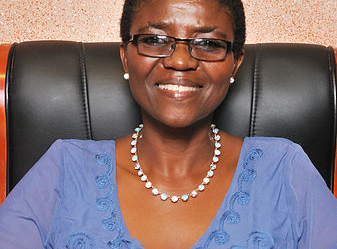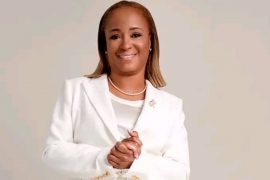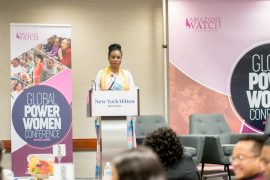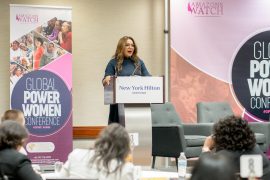With the various drives going on in Africa to reduce the number of people infected and living with HIV/AIDS, the Consortium of Leadership & Gender Experts (CLGE] has been set up to bridge the gender discriminations that exists on the continent. In an exclusive interview with Amazons Watch Magazine, Dr Tinaye tells us more about the future of Africa and what the plans for PLWHA are on the continent. Excerpts:
- Our findings reveal that you have put in over twenty years in the academia and social development in the areas of education, health – HIV/AIDS, & gender. Kindly tell about yourself and your career in these fields.
I am, first and foremost a nurse, at heart and by training but, I was never a clinical nurse! I went in as a Clinical Instructor/Student Fellow upon nursing training completion. After working for just over a year I went for further studies to read for a Bachelors’ Degree, Education at the University. Later, I obtained a Master of Science, Midwifery and Doctor of Philosophy (Sociology) Degrees. I lectured health professionals – Midwives – over a 15-year period. During this tenure, I rose through the academic ladder within a Public Tertiary Institution to the highest rank of Senior Lecturer and doubled as Program Coordinator for the program. I cherish those years since Midwifery is close to my heart. Back then, job satisfaction came from observing starry faced Midwifery novices turning into seasoned dexterous professionals capable of managing expectant women through the delivery of live and healthy bundles of joy! Many of my former students continue to humble me by expressing gratitude for setting them up a career advancement pathway every time we meet! As I also proved adept at administration, I swiftly progressed in my career to management level with the admiration of my peers and gratification of my employer. All this achievement came with hard work, humility and by Grace!
Notwithstanding this rather picturesque experience, professional agitation for better and bigger calls knocked at my door. This was in the form of organizational politicking and a nagging feeling to move on to other agendas. I was always passionate about making something out of myself by giving towards bettering other peoples’ lives. So, I joined international NGOs to do development projects addressing topical health issues of the day. In the early 2000s, HIV was the biggest deal. In 2002, together with the Country Director and I as Country Deputy Director set up a Botswana subsidiary of PSG-South Africa known as Matshelo Community Development Association (MCDA), to run an HIV Prevention Program for 11 SADC countries underfunding that was previously managed by the University of Botswana- Center for Continuing Education. The subsidiary CBO exists up to date. The project was a broad-based project and aimed at addressing foundational and structural barriers to HIV prevention. It adopted participatory educational and outreach approaches through the use of peer education techniques and targeted vulnerable and hard to reach community groups (including youth particularly girls, out of school youth, unemployed women and sex workers among others). It was a multi-faceted project with capacity building of core groups to cascade skills and knowledge to peers in their communities serving as the main instrument for operating at scale to attain a felt impact. In Botswana, we worked in 16 sites along the railway line and border town communities. It was a marvellous project that allowed African countries to share experiences on the trajectory of HIV and AIDS; research engagements and bring results from various parts of the sub-continent together creating holistic telling loops about the scourge and; create a momentous feeling for regional clusters to catch up or do better amidst a sense of camaraderie and oneness!
With lessons from MCDA work, regional and international exchanges, I set up a project as Country Director for Johns Hopkins University Center for Communication Programs in Botswana. The project, Gender Initiative on Girls’ Vulnerability, simply known as GGI for Go! Girls Initiative aimed at reducing girls’ vulnerability through a multi-dimensional approach embracing all groups of people that impact girls’ HIV status. It included intervention research- pre-assessments, designing action packages using research findings and developing relevant materials for the programs, working with communities to act and reviewing results of the action. I couldn’t benefit any better from a project and I regard it as the epitome of my career! The pleasure of working with mothers, girls and boys, adult men and women in their communities, tribal authorities, extension workers, government officials (middle supervisors) and policymakers was immeasurable. The enthusiasm and commitment to do something about their life situation and promote the safety of the girl child were palpable across communities. The greatest lesson for me was how lopsided our common top-down public planning undermines the very outcomes for which we strive! I thought a little nudge in the right direction for inclusivity and full participation of all towards solving social and development challenges can tip the scales positively big time. This was a turning point for me which explains my inspiration to found CLGE – a vehicle for transforming lives for the better!
Working for the UNDP, Botswana felt like a final stopover in my employment career for advisory/policy formulation and advocacy purposes. Given the wealth of lessons from the amazing organizations I partook in, surely, I wasn’t short of contributions. As Manager for the Country Office Health, HIV and Gender Programme, I smoothly contributed to the formulation, review and design of policies and guidelines working alongside government institutions. Some strategic formulations include; the National HIV/AIDS Strategic Plan and its implementation tools, Gender and Development Policy and needs assessment studies for various policy reforms e.g. family policy, gender mainstreaming in various policies etc. I enjoyed engagement in different dialogue platforms for many social and development work.
Familiarity with the UN system was an eye opener about the institutionalization of power and how national/regional/international efforts sidetrack the man on the ground despite the good intentions. Indication – there are gaps that require to be filled to complete the circuit by reaching out to where it matters most – grassroots!
- Botswana has the second highest HIV prevalence in the world with latest reports estimating it to be around 17.6% of the general population, 24% for 15 years and above age group, and 48.9% of women aged 30-34 years, while 33.3% of pregnant ones are HIV positive. What is your take on the prevalence of HIV/AIDs in Botswana?
Actually, figures were slightly adjusted according to the results of the last Botswana AIDS Impact Survey IV of 2013. Botswana has moved to third place after Lesotho and Swaziland. Prevalence now stands at 16.9%. Figures may not indicate a drastic improvement but, the downward trend is a promising sign. However, prevalence remains extremely high and it is expected to remain so for quite some time. To clarify, national prevalence shows how widespread the infection is in the country, i.e. the proportion of infected individuals to the population size. Given Botswana’s high infection rates in earlier years, it will take time to have more people in the population who are free of infection. These individuals are expected to come from uninfected newborn babies who will grow up into older population groups without being infected. Also, older people (children, youth and adults) who will remain uninfected should increase the size of the group of those people who remain free of infection in the population. I am happy to say we see signs that this picture is emerging. One good reason for this is the drop in the incidence rate (2.47 in 2013 from 2.9 in 2008). Incidence is the speed at which new cases occur over a period of time. But, Botswana’s challenge is to step up behaviour change efforts by helping individuals to become stronger in adopting safety measures. These measures should not be those highly reliant on biomedical techniques like PMTCT, which in our case contributed much to fall in incidence. We should plan of launching our HIV free infants into a childhood and youth space where they can be bold and resilient to avoid infection at all costs as they approach the riskiest years of their lives (adolescence and the childbearing period). These periods cover years that individuals are most sexually active. Serious dangers of HIV spread during the periods are associated with socio-cultural and gender inequalities and discrimination that increases risks for girls, women and inversely affects everyone. So, Botswana should implement combination prevention as soon as yesterday to reduce HIV incidence across a wide spectrum of population age groups resulting in much prevalence reduction. Such prevention measures require deliberate and coordinated empowerment of women, girls, men and boys towards a common vision, in addition to biomedical techniques
- Kindly tell us about your work and efforts in the fights against HIV/AIDS.
I am a people person who likes helping out all the time. So, I believe my work against HIV/AIDS began well before I started working on formal HIV related projects through my efforts as community worker towards all those around me – family, co-workers and social groups. I was always concerned about the consequences of behaviour on one’s life and was ready with a word of encouragement or counsel to support pro-life behaviour with tangible and sustainable benefits. This life outlook drifted me from the training of health professionals towards development projects. I started off as Country Deputy Director for Botswana in a regional HIV Prevention Program run for 11 SADC countries back in 2001 by Project Support Group (PSG) – a South African based NGO. We worked with universities on intervention research projects towards prevention – University of Botswana- Center for Continuing Education, University of Zimbabwe and the University of Oslo- Center for Anthropology. We also worked with vulnerable groups such as girls, out of school and unemployed youth, and women in communities to build their capacity and improve livelihoods. Then, I was Country Director for Botswana in a Johns Hopkins University –Center for Communications Programs project known as the Gender Initiative on Girls’ Vulnerability in three SADC countries – Botswana, Malawi & Mozambique. I was directing research activities for Botswana, planning program activities and overseeing all program activities in communities to complement regional project efforts. The focus was still on capacity building with an evidence base from the research findings to reduce girls’ vulnerability to HIV infection. I derived the greatest satisfaction out of my work life from these years as I could relate the value of academic work to life realities and at the same time bring worthy experiences to the learning table for dialogue and investigation. I regard this link as one of the biggest missing factors between education and its role in developing lives. Still in development work, I then worked for UNDP heading their Health/HIV and Gender Program. At this level my work focused on advisory services and policy formulation at national level. Tapping from my previous work experience I finally set up the Consortium of Leadership & Gender Experts [CLGE], a social enterprise that seeks to build leadership capacity for all to transform lives by addressing barriers such as discriminatory practices like gender, social exclusion by class/status etc. I believe the most lethal weapon for prevention of HIV transmission is the capacity to take charge of one’s life and avoid likely pitfalls that compromise individuals’ resilience and independence e.g. socio-cultural and gender pressures. I believe that taking charge of self is a leadership function!
- Findings reveal that gender discrimination continues to undermine efforts to ensure education for all, while over 80 per cent of children are in school in Botswana. Violence against women and girls, as well as problems with girls’ retention, continue to plague the school system. What are your thoughts on these and how do you think the society can address these challenges?
Challenges in the school system are only but an iceberg of a much wider social problem that plagues girls and women. Problems faced by girls at school are true signs of institutionalized social problems by gender lines. Problems in schools stand out because of the larger pool of girls in the same space over a period of time. But, imagine that individuals, girls and women are suffering the same fate silently in their various corners. Although everyone agrees that acts of violence and discrimination should be stopped, on a social level, tokenism exists. What I mean is that people believe that this is how society is and so, such acts should be expected – foundational misconceptions! It is important to instigate action for social transformation of both men and women at all levels – individual, peer networks, institutions and wider society. I believe the key to transformation is the creation of a shared vision in which both men and women are winners and beneficiaries with a vested interest in the change. As it is now, the gender equality drive appears to be characterized by opposing interests. We can never win, that way!
- How do you balance your family and career obligations?
I don’t cry for balance. I give thanks for the opportunity to do what I need to do when I do it! And still, give thanks for relaxation windows! That is what life is about. Balance comes because you are able to do what you like best, anywhere! My family is priority number one because relationships matter most to me. But, I am most pleasant and meaningful to them when I contribute at best towards my life course…. i.e. doing and saying that which brings a smile to everyone, fighting for fairness and justice for ALL. I am a grandmother of a lovely young girl. While I have always felt so much love for our son and daughter, I never felt so much fulfilment and a sense of extension into infinity until my granddaughter was born. It is such an amazing feeling…a blissful feeling of accomplishment that you cannot ascribe to any effort of yours! Although my husband hasn’t expressed it, I have always caught a glimpse of that contented smile on him when he watches the girl during her funny moments! The other thought that carries me through tough times is the love from mum and dad, and the feeling of belonging I developed growing up with my sisters.
- What’s the best way for the readers of Amazons Watch Magazine to connect with you (You can include links to your social networks and websites)
QUOTE: “I believe the most lethal weapon for prevention of HIV transmission is the capacity to take charge of one’s life and avoid likely pitfalls that compromise individuals’ resilience and independence.”




